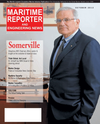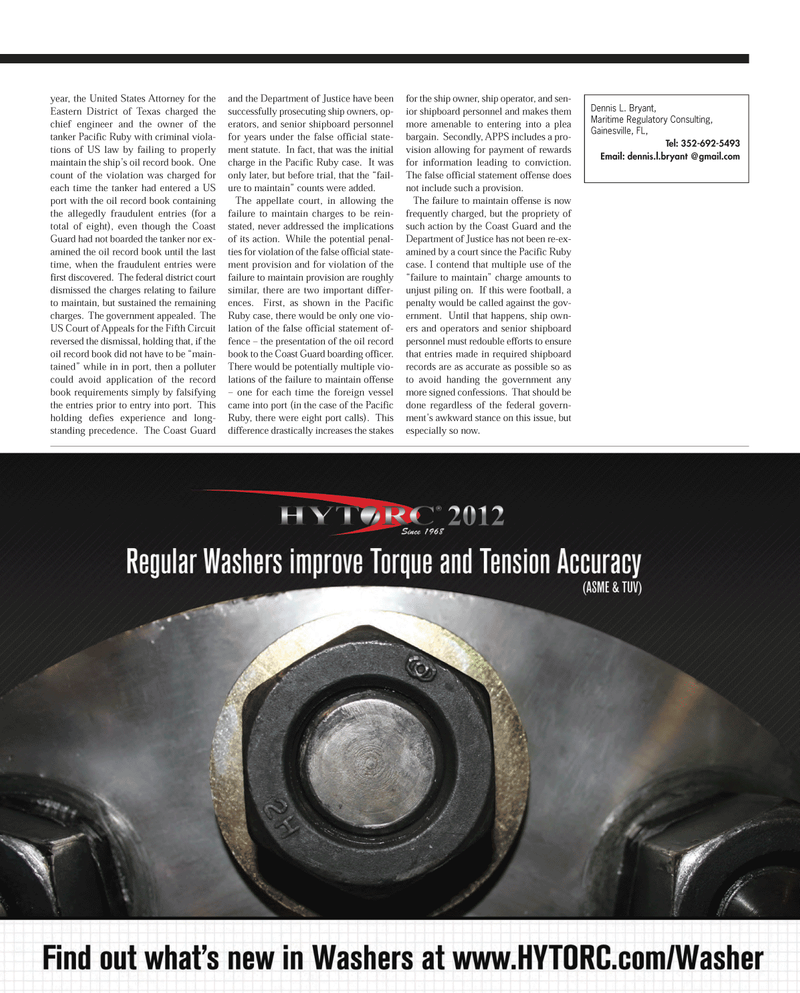
Page 19: of Maritime Reporter Magazine (October 2012)
Marine Design & Construction
Read this page in Pdf, Flash or Html5 edition of October 2012 Maritime Reporter Magazine
year, the United States Attorney for the Eastern District of Texas charged the chief engineer and the owner of the tanker Pacific Ruby with criminal viola- tions of US law by failing to properly maintain the ship?s oil record book. One count of the violation was charged for each time the tanker had entered a US port with the oil record book containingthe allegedly fraudulent entries (for a total of eight), even though the Coast Guard had not boarded the tanker nor ex- amined the oil record book until the lasttime, when the fraudulent entries werefirst discovered. The federal district court dismissed the charges relating to failure to maintain, but sustained the remaining charges. The government appealed. The US Court of Appeals for the Fifth Circuit reversed the dismissal, holding that, if the oil record book did not have to be ?main- tained? while in in port, then a pollutercould avoid application of the record book requirements simply by falsifying the entries prior to entry into port. This holding defies experience and long- standing precedence. The Coast Guard and the Department of Justice have been successfully prosecuting ship owners, op- erators, and senior shipboard personnelfor years under the false official state- ment statute. In fact, that was the initial charge in the Pacific Ruby case. It was only later, but before trial, that the ?fail- ure to maintain? counts were added.The appellate court, in allowing the failure to maintain charges to be rein- stated, never addressed the implications of its action. While the potential penal- ties for violation of the false official state- ment provision and for violation of the failure to maintain provision are roughly similar, there are two important differ- ences. First, as shown in the Pacific Ruby case, there would be only one vio- lation of the false official statement of- fence ? the presentation of the oil recordbook to the Coast Guard boarding officer. There would be potentially multiple vio- lations of the failure to maintain offense ? one for each time the foreign vessel came into port (in the case of the Pacific Ruby, there were eight port calls). This difference drastically increases the stakes for the ship owner, ship operator, and sen- ior shipboard personnel and makes them more amenable to entering into a pleabargain. Secondly, APPS includes a pro- vision allowing for payment of rewards for information leading to conviction. The false official statement offense does not include such a provision. The failure to maintain offense is now frequently charged, but the propriety of such action by the Coast Guard and theDepartment of Justice has not been re-ex- amined by a court since the Pacific Ruby case. I contend that multiple use of the?failure to maintain? charge amounts to unjust piling on. If this were football, apenalty would be called against the gov- ernment. Until that happens, ship own- ers and operators and senior shipboardpersonnel must redouble efforts to ensure that entries made in required shipboardrecords are as accurate as possible so asto avoid handing the government any more signed confessions. That should be done regardless of the federal govern- ment?s awkward stance on this issue, but especially so now. Dennis L. Bryant, Maritime Regulatory Consulting,Gainesville, FL, Tel: 352-692-5493 Email: dennis.l.bryant @gmail.com MR#10 (18-25):MR Template 10/2/2012 10:40 AM Page 19

 18
18

 20
20
